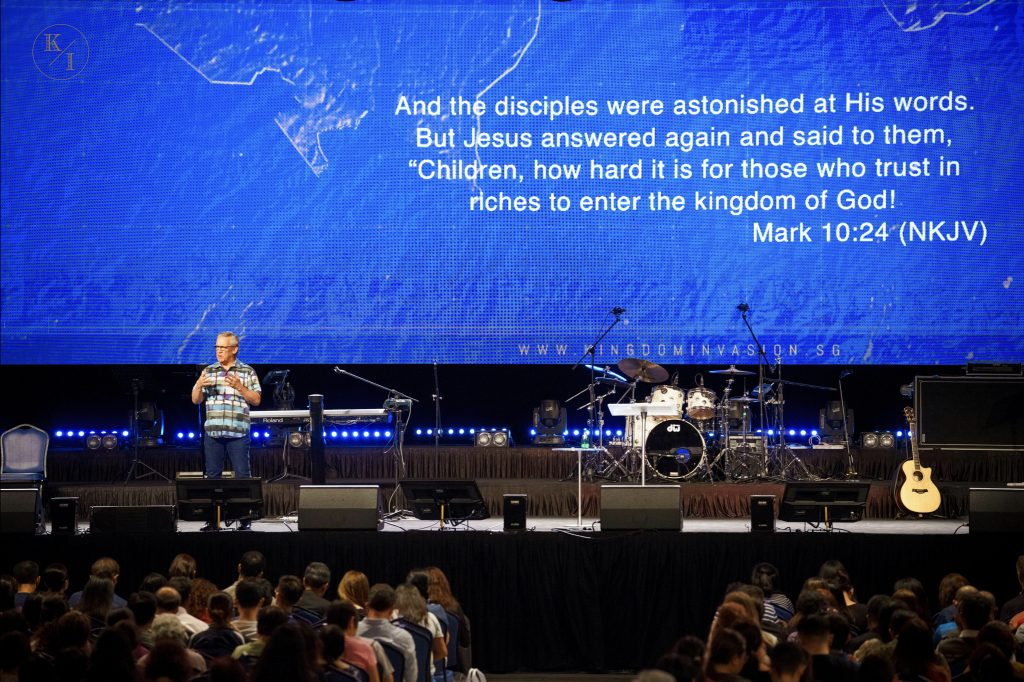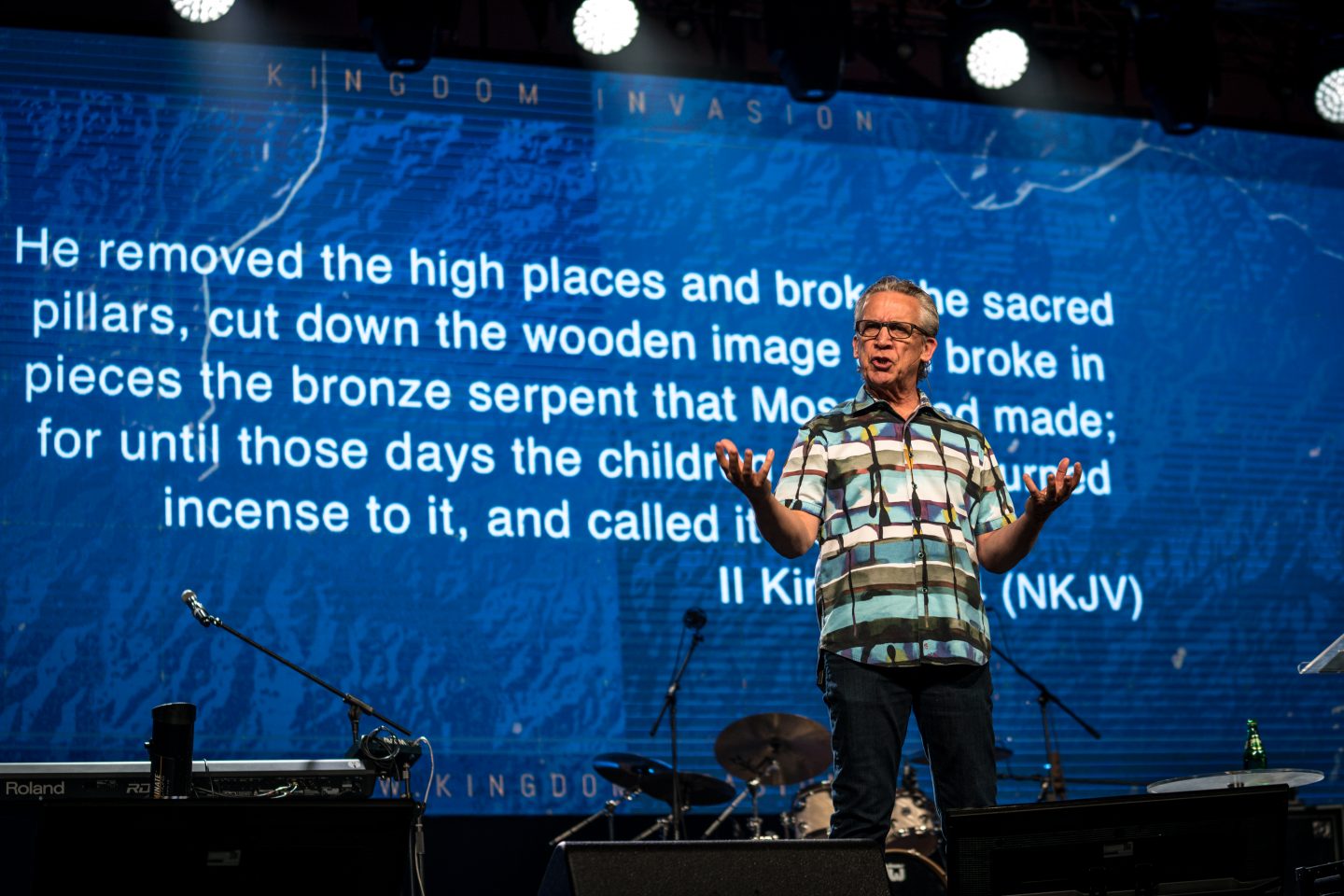“An inheritance is something somebody else paid for,” Bill Johnson said gravely. “But if we are going to continue an inheritance, to increase it, we need to pay an even higher price.”
Speaking on the second day of Kingdom Invasion 2018, the Senior Pastor of Bethel Church, Redding, cautioned the 3,500 strong audience against spiritual complacency.
Drawing from the life of King Hezekiah, Johnson shared about the king’s early days as a strong political and spiritual leader of Israel who reformed his nation, calling it back into covenant with God during one of its darkest and most corrupt seasons.
“He did what was right in the eyes of the Lord, just as his father David had done. He removed the high places, smashed the sacred stones and cut down the Asherah poles. He broke into pieces the bronze snake Moses had made, for up to that time the Israelites had been burning incense to it.” (2 Kings 18:3-4)
Hezekiah was a man whom God Himself acknowledged as “a king like no other”, and unlike his predecessors, removed the high places of idol worship in his country and brought back worship as in the days of King David.
“Hezekiah trusted in the Lord, the God of Israel. There was no one like him among all the kings of Judah, either before him or after him. He held fast to the Lord and did not stop following him; he kept the commands the Lord had given Moses.” (2 Kings 18:5-6)
However, things took a downturn after he was saved from the mouth of death by a gracious act of God to heal his terminal illness and extend his life by 15 years (2 Kings 20). Johnson pinned the start of his ultimate demise on the king’s failure to offer to the Lord a sacrifice “equal to his miracle” after he was healed.
“But Hezekiah’s heart was proud and he did not respond to the kindness shown him; therefore the Lord’s wrath was on him and on Judah and Jerusalem.” (2 Chronicles 32:25)
“You could say it was a token response to a supernatural act,” Johnson said. “The moment I take something God’s done for me lightly is the moment callousness begins in my heart.”
Something must have changed in the king’s heart after his miracle, he continued. He not only failed to offer sincere thanksgiving to God, he even grew proud and flaunted his wealth to enemy nations (2 Kings 20:12-19).

And it was complacency enough to completely turn the tide on the legacy he’d earlier built as a king after God’s heart – right down to Hezekiah feeling glad when the prophet Isaiah declared God’s resulting judgement for his pride on future generations – because he would not have to personally live through them (2 Kings 20:16-19).
“’The word of the Lord you have spoken is good,’ Hezekiah replied. For he thought, ‘Will there not be peace and security in my lifetime?’” (2 Kings 20:19)
“I don’t know how King Hezekiah got to that point,” said Johnson, prompting the audience to consider their own lives. “But while everything looked right on the outside, there was no fire on the inside.”
Judgement fell upon the kingdom soon enough. His son Manasseh, who took over the throne at age 12, went on to become one of Israel’s most wicked kings – leading to a complete erosion of the spiritual inheritance left by his father.
Despite the fervour and favour his father once had for God, all came to naught as Manasseh rebuilt the high places that had been demolished, reinstated idol-worship and built altars in the tabernacle. Practice of witchcraft became rampant (2 Chronicles 33).
And if Manasseh was 12 when he became king, this meant that he was raised in Hezekiah’s extended years of life – years where he had already grown complacent with God.
While everything looked right on the outside, there was no fire on the inside.
“There were probably semblances of the days of worship decreed by his father,” Johnson conjectured. “But if Hezekiah’s passion for God was waning, Manasseh might very well have been raised on token representations of religion.”
That’s how fast the winds of destiny could turn from one generation to the next in the face of spiritual complacency. Johnson used the Matthew 12 analogy of the strong man (Matthew 12:29) and the unclean spirit (Matthew 12:43-45) to explain this further.
Like our spiritual forefathers who have contended for breakthrough, personally as well as in the local body of Christ, years of ministry and intercession “binds the strong man” – the evil strongholds in our lives – and makes way for God to move in.
This is what Hezekiah did in the early days of his kingship, and what revivalists such as John Sung and Billy Graham have done for Singapore.
But it’s easy to take our inheritance lightly, especially when it’s been freely given to us by those who’ve tilled the ground and sowed the seed before.

“After years of walking with the Lord it’s easy to get into a routine – to know how to sing the worship songs, dance along, talk like a Christian, but I could do all of that and never have my heart healed and transformed,” Johnson said in reference to Hezekiah’s backsliding and Manasseh’s upbringing and ultimate kingship.
“If the next generation does not properly occupy the inheritance given to it, if the house is found empty instead of filled with the presence of God – the stronghold comes back even stronger.”
“’When the unclean spirit has gone out of a person, it passes through waterless places seeking rest, but finds none. Then it says, ‘I will return to my house from which I came.’ And when it comes, it finds the house empty, swept, and put in order. Then it goes and brings with it seven other spirits more evil than itself, and they enter and dwell there, and the last state of that person is worse than the first. So also will it be with this evil generation.’” (Matthew 12:43-45)
And just like that, Hezekiah’s great spiritual inheritance from his reformation was overthrown within a generation – by a son whose name is now synonymous with corruption and evil.
Johnson’s question for Singapore was this: What will we do with our spiritual inheritance, the favour and blessing of the Lord upon our nation?
He reiterated several times, “The problem is not with God’s favour and blessing. It’s how we respond to it.”
Like Lou Engle the night before and Heidi Baker who spoke before him, Johnson’s exhortation for Singapore was to not flaunt our inheritance or grow complacent in comfortable times – but to use favour and blessing for God’s purposes instead.
After all, this is but a small price to pay in light of the present and eternal riches God has faithfully rewarded his children with.
Kingdom Invasion 2018 will run until Friday at Singapore Expo Halls 7/8. Night sessions starting from 7:30pm are free, subjected to availability of seats. For more details, visit www.kingdominvasion.sg.









